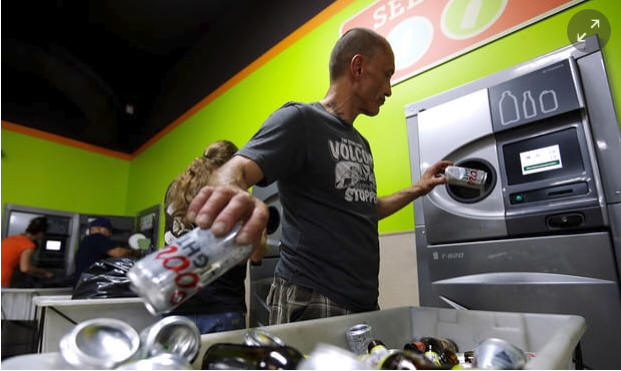
All drinks containers in England, whether plastic, glass or metal, will be covered by a deposit return scheme, the government has announced.
The forthcoming scheme is intended to cut the litter polluting the land and sea by returning a small cash sum to consumers who return their bottles and cans.
Similar schemes operate in 38 countries, and campaigners have worked for a decade for its introduction in England.
Fees vary depending on the size of the bottle or can and many use “reverse vending machines” to automate the return.
Once returned, retailers are responsible for properly recycling the containers. Deposit return schemes (DRS) have increased recycling rates to more than 90% in other countries.
At present just 43% of the 13bn plastic bottles sold each year in the UK are recycled, and 700,000 are littered every day. In Germany, a DRS was introduced in 2003 and 99% of plastic bottles are recycled.
“We can be in no doubt that plastic is wreaking havoc on our marine environment,” said the environment secretary, Michael Gove.
“It is absolutely vital we act now to tackle this threat and curb the millions of plastic bottles a day that go unrecycled. We have already banned harmful microbeads and cut plastic bag use, and now we want to take action on plastic bottles to help clean up our oceans.”
The new DRS for England announced by Gove is subject to a consultation this year and it is not yet clear whether all retailers of single-use drinks will be required to participate.
The government says it “will only take forward options from the consultation which demonstrate that they offer clear benefits and are resistant to fraud, and costs on businesses, consumers and the taxpayer are proportionate”.
The Campaign to Protect Rural England (CPRE) has lobbied for a DRS for a decade and its litter programme director, Samantha Harding, said: “I am thrilled that we will finally see the many benefits a deposit system will bring to England, not least the absence of ugly drinks containers in our beautiful countryside.
“What’s significant is that producers will now pay the full costs of their packaging, reducing the burden on the taxpayer and setting a strong precedent for other schemes where the polluter pays,” she added.
Bill Bryson, author and former CPRE president, said: “I wholeheartedly congratulate Michael Gove for his wisdom in finally accepting the case for a deposit return system in the UK.”
The Green party’s co-leader Caroline Lucas, a member of the Environmental Audit Committee of MPs which backed a DRS in December, said: “After a long delay it is good to see the government moving forward on this issue. This scheme should have been introduced long ago – and it is just the tip of the iceberg when it comes to reducing plastic waste.”
“If ministers really are serious about tackling the scourge of plastic pollution they will implement this deposit return scheme as soon as possible, then revise their utterly unambitious target of eliminating unavoidable single-use plastics by 2042,” she said.
Tanya Steele, WWF’s chief executive, said: “Plastic waste in the UK will rise by a fifth by 2030. We need to be tackling the problem on all fronts by reducing, reusing and recycling. That means introducing a standard approach to recycling and, ultimately, ending the use of avoidable single-use plastic by 2025.”
Elena Polisano, oceans campaigner at Greenpeace UK, said: “It’s good to see the government listen to public opinion. If the system is UK-wide, applicable to drinks containers of all sizes, and available everywhere they are sold, it will make a huge difference to the plastic problem.”
But she added: “The government must be careful to avoid a voluntary scheme that only applies to some retailers.”
Scotland announced its plan for a DRS in September and the Westminster government said it would talk to the devolved administrations about working together on the issue. The Co-op and Aldi have backed a DRS, but the British Retail Consortium has opposed it.
The number of single-use plastic bags used in England has fallen by 80% since a 5p charge was introduced, and the country has followed the US and others in banning plastic microbeads in personal hygiene products.
However, another environmental scheme touted by ministers – a scrappage scheme for highly polluting diesel cars – appears to have been dropped.
Last year a Guardian investigation revealed that a million plastic bottles are made around the globe every minute – and that figure is only likely to increase after it emerged that fossil fuel companies are investing billions of pounds in new plastic production facilities in the US.
In the UK supermarkets are a major source of plastic pollution. This year the Guardian reported that the major chains create almost 1m tonnes of plastic packaging waste every year.
